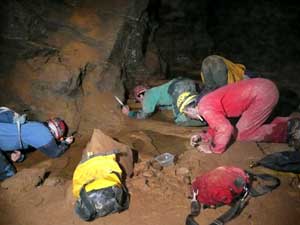
Biologists at work. Photo by Phil Lucas.
Last Update: 1 March 2008

|
Dan Fong’s Report: Here is what we have from Butler so far. Quite interesting.

|

|
|
Two views of the very small snail, Fontigens morrisoni. The marks on the rock are tracks where the snail has been foraging. Photos by Phil Lucas. | |
Charlotte and I are excited that Dan Fong and his colleagues were interested in doing biological collecting in Butler Cave. Their results are very interesting! The specimens they collected are ranked as follows:
So what are these rankings? The following information is from the Virginia Department of Conservation and Recreation’s Natural Heritage Program:
Global ranks are assigned by a consensus of the network of natural heritage programs, scientific experts and NatureServe to designate a rarity rank based on the range-wide status of a species or variety. Ranks are assigned after considering a suite of factors, including number of occurrences, number of individuals and severity of threats.
State ranks are assigned in a manner similar to the described for global ranks, but consider only those factors within the political boundaries of Virginia.
So, as you can see, we have some special critters in Butler Cave. But the main reason for this long report is about our snail. In 2005 Wil Orndorff wrote to VSS about DGIF recommending the listing of Fontigens morrisoni (our snail) as state endangered. DGIF stated in 2005 that through input from the best-identified experts, Fontigens morrisoni is listed as a Tier 1 species, which is defined as “Critical Conservation Need.” This snail was last seen in Blowing Cave, Bath county in the 1940s, or this is what we thought at the time. This started the search for records of any collecting for this snail.
In the NSS Bulletin, v.7, December 1945, article on Withero’s Cave, “The finding of a permanent stream on a field trip in May 1941 opened up a field for additional work in this cave; and interest was further heightened when Dr. Joe Morrison found that the stream supported a colony of blind snails.”
The first mention that we could find was 22 June 1941 when John Petrie collected a snail from Blowing Cave to give to Dr. Morrison. By the way, this article is a great read. The party of three men found the stream in Blowing and eventually exited the cave using only one flashlight, with all their other lights not working.
Will Orndorff tried to find the snail in Russell’s Reserve Cave in 2006 but was not successful. John Holsinger in the 1960s found snails in Butler’s Sinking Creek but these were not identified as the Fontigens morrisoni.
So enjoy our little snail! Look at the rock in the photos above and you can see snail trails where they have been eating nutrients on the surface of the rock.
Happy New Year little snail – may you have many more years prospering in Butler Cave.
Charlotte and Phil Lucas

Biologists collecting specimens along Sinking Creek in Butler Cave.
Photo by Phil Lucas.